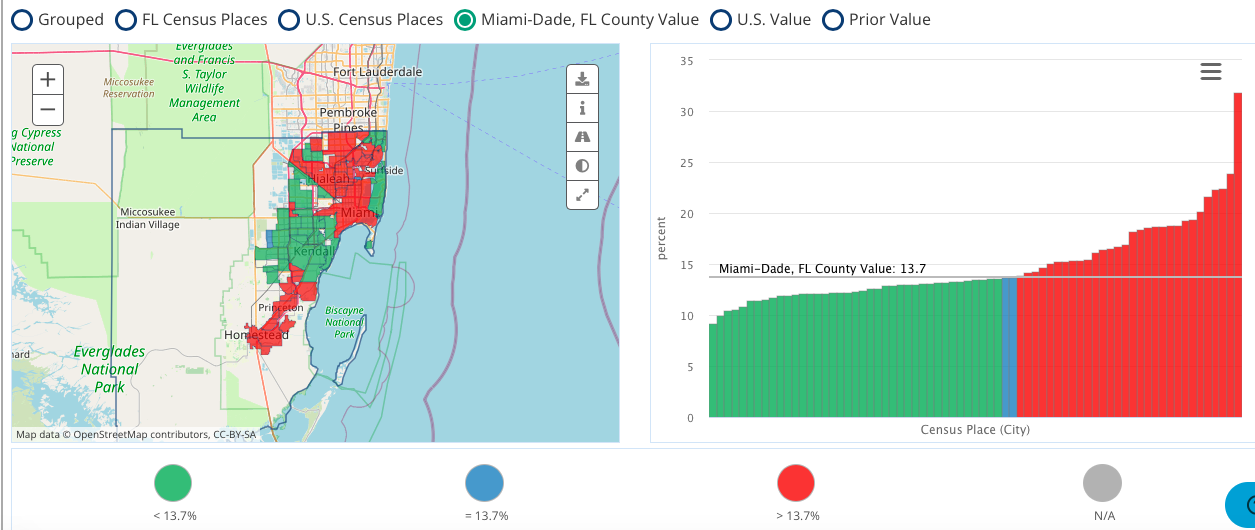Problem Statement
Mental health and behavioral disorders are central in human existence are they are the basement of all other possible issues. With a strong psychological and emotional condition, a person has an adequate self-perception, motivation level, and speed of life. If psychological concerns are met in adolescence, it may impact the future development of a person, as teenagers’ nervous system is more vulnerable to the changes in the outside world. Today I want to talk about the issue of limited access to behavioral and mental health services in Miami, Florida.
Why does Miami face an increased number of mental health disorders among its citizens? In 2019, Conduent Healthy Communities Institute surveyed people of various cities in Miami-Dade, and from 9.2% to 31.9% of surveyed adults stated their mental health was not good (Conduent Healthy Communities Institute, 2019). This map shows the results of the survey with the regions having the highest value.

Apart from residents’ feedback, Florida was proved to be one of the lowest per capita mental health expenditures in the U.S. (Heekin, 2021). After the Affordable Care Act (ACA) was taken in 2010, the state refrained from expanding access to Medicaid coverage. That leaves almost 900,000 uninsured and indigent residents without healthcare and significantly limits access to residents of low income (Zhang et al., 2019).
Background
In 2010, Patient Protection and ACA were enacted to expand the access to Medicaid coverage for adults with incomes below 138% and 400% of the FPL (Zhang et al., 2019). The law brought significant changes even though a great number of low-income adults remained uncovered. Nevertheless, ACA was an optional choice for individual states, and Florida refrained from it.
Since 2002, mental and behavioral health issues have been proven to be economically disadvantaged branches in Miami (Heekin, 2021). Restricted financing led to limited resources of the clinics, a low number of mental healthcare professionals, and decreased number of residents receiving proper help. As a result, the majority of citizens with mental health disorders deteriorate their condition, which causes greater costs for their treatment in the future.
Landscape
The issue of ACA acceptance remains unclear as the U.S. government proposed the state to cover the spending on the Medicaid expansion. Florida Policy institute calculated that by accepting the proposal, Florida state could save $3.5 billion (Rohrer, 2021). This would offer coverage to 800,000 more Floridians (Rohrer, 2021). However, the local government stays opposed to Medicaid expansion. The reasons for the tactics remain unclear to the majority of the population.
The political strategy brings up various questions among citizens. The locals claim they have concerns in a long-term perspective after program acceptance. However, the proposal has an obvious economic profit. The federal government would have covered all the costs for expansion at first before their share reduces to 90% (Rohrer, 2021). Floridian government still has concern for the 10% in the following years. Such defensive strategy leaves uninsured some low-income citizens uncovered.
Options
Healthcare facilities in Miami are on a decent level providing patients of different ages various treatment programs. Experienced professionals work with psychological, psychiatric, and behavioral pathologies guiding the patient through the care. The state has an adult outpatient center that simplifies access to individuals suffering from substance abuse disorders, depression of various severities, and behavioral issues. The quality of service is decent, according to the up-to-date standards and guidelines. However, the care itself is not affordable to the majority of the residents.
Children’s services do not concede adult facilities with quality of aid. The children can be diagnosed for having any psychological or behavioral deviations with various tests, and in case of identifying some, they can choose comprehensive psychological aid. Healthcare professionals organize individual, group, and family gatherings to discuss the psychological issues of the patient. For the children having difficulties with pronunciation, the state provides dialectical behavior therapy. The main purpose of the state should be the focus on the accessibility of these treatment and diagnostic services as some children and teenagers come from low-income or indigent families.
Recommendations
To tackle the problem, the local government should reconsider its position towards Medicaid expansion. It can increase the financing of the state and provide more options for budget spending. The financing of mental health and behavioral disorders can be increased to ameliorate resources of the clinics and hospitals increase the number of psychologists, psychiatrists, and healthcare professionals.
Psychological aid and monitoring should also be improved from the society: at schools, colleges, and public services. Identifying possible predispositions of the pathologies can help diagnose them in the early stages and prevent the worsening of the patients’ conditions. When the patient goes through the treatment, planned check-ups with a doctor might be helpful and motivating to finish the course. Involving family members in group therapies can help adolescents and children increase motivation and feel supported and considered.
References
Conduent Healthy Communities Institute. (2019). Poor mental health: 14+ days. Web.
Heekin, K. (2021). Mental health expenditures in Florida: Concerning trends throughout the past decade. Florida State University. Web.
Rohrer, G. (2021). Florida is unlikely to expand Medicaid for 800,000 residents, despite the offer of more federal money. Orlando Sentinel. Web.
Zhang, M., Garcia, A., & Bretones, G. (2019). Demographics and clinical profiles of patients visiting a free clinic in Miami, Florida. Frontiers in Public Health, 7(212), 1-8. Web.

